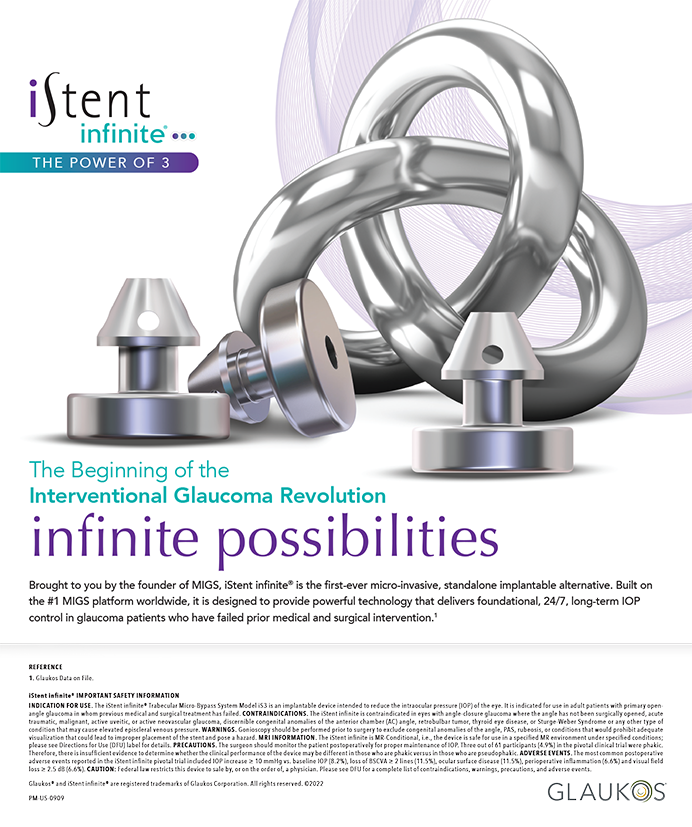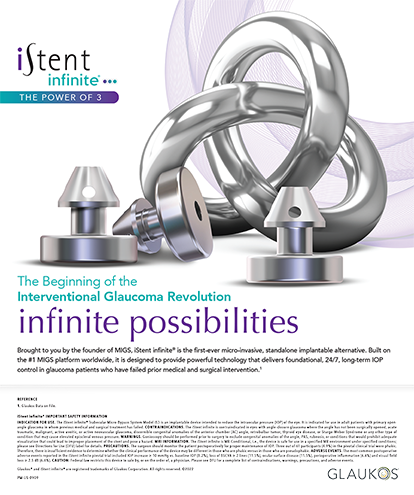When we talk about experience in refractive surgery, we're usually referring to the number of cases a surgeon has performed. This definition has created a pecking order within every community of surgeons: Dr. A is the busiest, Dr. B is second busiest, and so on. I think it's time we turned the table around to look at experience from the patient's perspective. Why? Because having a lot of procedures under your belt is no longer a sustaining advantage over your peers. Many surgeons have surpassed the amount of experience required to overcome the learning curve associated with LASIK.
By expanding the definition of experience to include understanding how the patient experiences the LASIK decision process and procedure under your care, you begin to see your patients in a whole new light. If you ever saw The Doctor, a movie starring William Hurt as an egocentric heart surgeon, you know about this shift in perspective. In this film, the hot-shot doctor was diagnosed with a tumor and had a rare opportunity to live in the patient's shoes. What he experienced horrified him to the point that he demanded changes in the system to better address the true needs of patients.
One surgeon's novel insight into the patient experience at a hospital is an example of a major topic in marketing and branding activity. A while back I was invited to a marketing conference regarding what makes a brand great in the mind of the consumer. After listening to dozens of speakers, one conclusion was pretty clear: Marketing was quickly headed toward driving brand loyalty through the overall experience that the consumer had using the product or service. It mattered less and less how “cool” your name or logo was (think “Yahoo!”); instead, it was the end-to-end customer experience that would increasingly mean success or failure for the brand.
DOCTOR AS BRAND
Without question, this principle also applies to the marketing of refractive surgery. Unfortunately for the refractive surgeon, med school didn't offer courses on marketing, much less instruction on how to “brand” your services to create a unique niche in your community relative to other providers. Nonetheless, the marketing concept called “brand building” has always been around for the medical profession. As recently as 20 years ago, brand building was simply thought of as building a good reputation in your community. Now, societal pressures, especially the notion that “time is money,” have forever changed the service-based professions. Consumers expect, and, in fact, demand high levels of service. Medical consumers are no exception, and refractive surgeons have no choice but to expand their efforts to establish a good reputation that includes all of the customer-service elements that will help build their brand.
Don't let a lack of formal marketing training intimidate you. For those of you who have been jaded by the current state of the industry, listen up. You don't have to solve the “chicken or egg?” dilemma on LASIK marketing, which plays out something like this: “I know I need to advertise in order to attract patients, but I also need to perform enough cases in order to have money to pay for the advertising.” This type of “numbers game” will likely keep you from doing anything to improve the long-term prospects of your refractive practice; it's played whenever you contemplate what it takes to be successful: Hiring a marketing coordinator, moving to a better location, and so on.
BACK TO BASICS
All of these features should be thought of as higher-order issues that should be addressed only after some of the basic building blocks are in place. First, focus on the foundational issues of customer service, such as telephone etiquette, providing accurate and easy-to-digest information, and offering warmth and compassion to those seeking your care. Why are these of greater importance? Because, with refractive surgery, attracting prospective patients through external marketing is the beginning—not the end—of the decision-making process. Once a prospective patient finds you, it no longer matters how they arrived at your door. What they perceive and experience from that point forward is what counts.
ROLE REVERSAL
One of the best ways to understand refractive patients' experiences is to undergo LASIK yourself. If you were to analyze LASIK procedural volumes among refractive surgeons, I'd bet a lot of money that those who have had the procedure themselves perform significantly more procedures than their counterparts who still wear glasses. Part of this may be due to the obvious endorsement by the provider who “took his own medicine.” But more importantly, the experience of being a LASIK patient can create an awareness and sensitivity that is apparent to prospective patients. Understanding where the person across from you is coming from is a basic tenet of good care. As author Stephen Covey states, one of the seven habits of highly effective people is to “Seek first to understand, then to be understood.” And so it is with LASIK. There is no substitute for understanding the LASIK experience by becoming the patient. Moreover, every staff member who is a candidate should also become an advocate for the procedure and those persons considering it.
WORD OF MOUTH
More than anything else, it is our experiences as consumers that define our recommendations to others. Take a moment and think about something you recently enjoyed doing and later told your friends about. Chances are, you made mention because the experience so completely exceeded your expectations. It wasn't about the money you spent; it was about the value you received relative to your investment of time and money. One of my personal favorites is Netflix, the DVD rental service that eliminates the hassle of renting movies to watch at home. Choosing movies from their Web site's virtual library and then receiving them in the mail is so much more fun that our family has, in turn, influenced a lot of friends to try their movie delivery service.
PERCEPTION AFFECTS EXPERIENCES
Focusing specifically on LASIK, the patient's experience extends far beyond their moments under the laser and the occasional postoperative visit. We tend to define their experience from our vantage point (ie, when we see them for surgery). But in reality, patients go through dozens of checkpoints at which they are evaluating (sometimes unconsciously) their feelings and attitudes toward you and your staff. All of these can positively or negatively affect how a patient judges the overall experience, perhaps even more strongly than the clinical outcome of the procedure. I suspect that when a patient is unhappy, the roots of dissatisfaction have little or nothing to do with the clinical or technical aspects of the procedure. Most of the negative consequences can usually be traced back to one of two things: The provider either said too much (created unrealistic expectations) or listened too little (didn't hear what the patient was truly saying or asking).
EXPERIENCE AFFECTS PERCEPTION
Patient perception affects experience, and that experience will, in turn, affect their ongoing desire to recommend the LASIK procedure and (hopefully) you to perform it. We all understand that the basic procedure itself yields tremendous positive benefits; the key is to create such a strong experience that you and the procedure are forever bonded together in the patient's mind. The strength of that bond is often the difference between a patient saying to their friend, “You gotta have this too,” versus steering that friend directly to you.
In short, you would be wise to pay attention to the overall experience of each and every one of your LASIK patients. Becoming a patient yourself will help you tune in to what's really happening at every step of interaction that you and your staff have with patients. Pay attention to each of the little things, and the big thing, your brand, should get a major boost.
Each month, industry veteran Shareef Mahdavi looks at a different topic relating to the business of refractive surgery, exploring how mistakes from the past can be used by all providers for effective marketing. He was formerly the head of marketing for VISX and is based in Pleasanton, California. Mr. Mahdavi may be reached at (925) 425-9963; shareef@sm2consulting.com


